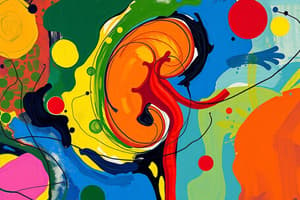Podcast
Questions and Answers
What is the primary goal of homeostasis in the body?
What is the primary goal of homeostasis in the body?
- To maximize exercise performance
- To maintain equilibrium around a set point (correct)
- To increase the body's energy levels
- To enhance muscle recovery
What is referred to as recovery time following exercise?
What is referred to as recovery time following exercise?
- The time taken to cool down after exercising
- The duration of the actual exercise session
- The duration until the pulse rate matches the resting pulse rate (correct)
- The time taken to reach maximum heart rate
What wavelengths does chlorophyll absorb primarily?
What wavelengths does chlorophyll absorb primarily?
- Blue and red light (correct)
- Orange and violet light
- Green and infrared light
- Green and yellow light
How does the body respond to changes in a regulated variable during exercise?
How does the body respond to changes in a regulated variable during exercise?
Which phase of photosynthesis is responsible for converting sunlight into chemical energy?
Which phase of photosynthesis is responsible for converting sunlight into chemical energy?
Which factor can influence the variability in the recovery process?
Which factor can influence the variability in the recovery process?
What physiological process during recovery is distinct from the exercising and resting states?
What physiological process during recovery is distinct from the exercising and resting states?
What does the absorption spectrum of chlorophyll indicate?
What does the absorption spectrum of chlorophyll indicate?
What does osmosis refer to in terms of water movement?
What does osmosis refer to in terms of water movement?
What occurs to the cardiovascular system after exercise regarding recovery?
What occurs to the cardiovascular system after exercise regarding recovery?
How is osmotic pressure calculated?
How is osmotic pressure calculated?
During recovery from exercise, which of the following is NOT true?
During recovery from exercise, which of the following is NOT true?
What happens to electrons in pigments during photon absorption in photosynthesis?
What happens to electrons in pigments during photon absorption in photosynthesis?
What is the impact of exercise on the cardiovascular system?
What is the impact of exercise on the cardiovascular system?
What is the primary outcome of the light-dependent phase of photosynthesis?
What is the primary outcome of the light-dependent phase of photosynthesis?
Which type of cell has the same osmotic pressure as its surrounding solution?
Which type of cell has the same osmotic pressure as its surrounding solution?
What is the second-most common form of carotene in plants?
What is the second-most common form of carotene in plants?
Which of the following is true about xanthophylls?
Which of the following is true about xanthophylls?
What serves as the source of carbon in the Light-Independent Phase?
What serves as the source of carbon in the Light-Independent Phase?
Which pigment is responsible for giving corn its yellow color?
Which pigment is responsible for giving corn its yellow color?
What storage form does plant carbohydrate primarily take?
What storage form does plant carbohydrate primarily take?
What is the main solvent used in the extraction of plant pigments?
What is the main solvent used in the extraction of plant pigments?
What is the general term for the location where plant pigment is stored?
What is the general term for the location where plant pigment is stored?
Which of the following is true about chlorophyll and other pigments?
Which of the following is true about chlorophyll and other pigments?
What is the primary role of RuBisCO in the Calvin Cycle?
What is the primary role of RuBisCO in the Calvin Cycle?
During which phase of the Calvin Cycle is G3P produced?
During which phase of the Calvin Cycle is G3P produced?
What happens to the 6-carbon compound formed in the Calvin Cycle after CO₂ is fixed to RuBP?
What happens to the 6-carbon compound formed in the Calvin Cycle after CO₂ is fixed to RuBP?
Which molecule is critical for providing energy to the Calvin Cycle?
Which molecule is critical for providing energy to the Calvin Cycle?
How many molecules of G3P are needed to form one glucose molecule?
How many molecules of G3P are needed to form one glucose molecule?
What is the purpose of the Regeneration Phase in the Calvin Cycle?
What is the purpose of the Regeneration Phase in the Calvin Cycle?
What is produced during the Reduction Phase of the Calvin Cycle?
What is produced during the Reduction Phase of the Calvin Cycle?
Which of the following statements about cavitation is correct?
Which of the following statements about cavitation is correct?
What is the function of NADP Reductase in photosynthesis?
What is the function of NADP Reductase in photosynthesis?
Which light wavelengths are most effective for photosynthesis?
Which light wavelengths are most effective for photosynthesis?
What role does Plastoquinone (Q) play in the Electron Transport Chain (ETC)?
What role does Plastoquinone (Q) play in the Electron Transport Chain (ETC)?
What is the primary source of oxygen produced during photosynthesis?
What is the primary source of oxygen produced during photosynthesis?
How do protons (H+) contribute to ATP production in photosynthesis?
How do protons (H+) contribute to ATP production in photosynthesis?
What specialized tissue in Myriophyllum aids in gas exchange?
What specialized tissue in Myriophyllum aids in gas exchange?
What process occurs in the Calvin-Benson Cycle?
What process occurs in the Calvin-Benson Cycle?
How does the aerenchyma support Myriophyllum in anoxic soil conditions?
How does the aerenchyma support Myriophyllum in anoxic soil conditions?
Study Notes
Homeostasis and Recovery
- Homeostasis aims to maintain equilibrium around a set point, typically a resting state.
- Pulse rate is measured immediately after exercise, then monitored during the recovery period until it matches the resting rate.
- Recovery time refers to the duration it takes for the body to return to a resting state post-exercise, crucial for cardiovascular adaptations.
- Recovery of the cardiovascular system can occur within minutes to hours, with variations based on training status.
Osmosis and Osmotic Pressure
- Osmosis is the movement of water across a semipermeable membrane from areas of low solute concentration to high solute concentration.
- Osmotic pressure can be calculated using the formula: V = R⋅T⋅cs, where V is the osmotic pressure, R is the gas constant, T is temperature in Kelvin, and cs is solute concentration in mol/L.
- Cells can be isoosmotic, having equal osmotic pressure with their solution.
Photosynthesis Stages
- Photosynthesis consists of two phases: Light-Dependent and Light-Independent (Calvin Cycle).
Light-Dependent Phase
- Energy from sunlight is converted into ATP and NADPH; photon absorption causes pigment excitation, boosting electrons to higher energy levels.
- Key enzymes are NADP Reductase (for NADPH) and ATP Synthase (for ATP).
- Water is split to produce oxygen, with tasks divided among components like Photosystem II and plastoquinone.
Light-Independent Phase (Calvin Cycle)
- Does not require light and can occur anytime, involving CO₂ fixation through RuBisCO.
- The cycle starts with the combination of CO₂ and ribulose bisphosphate (RuBP), forming an unstable compound that breaks down into 3-phosphoglycerate (3-PGA).
- G3P, a product of the cycle, is a precursor to glucose, requiring two G3P molecules to form one glucose.
Pigments and Solubility
- Chlorophyll reflects green light while absorbing blue and red wavelengths, essential for photosynthesis.
- Various pigments exist: α-Carotene, xanthophylls, lutein, and zeaxanthin; they assist in maximizing energy absorption across wavelengths.
- Plant pigments, including chlorophyll, are lipids, with solubility varying across solvents, primarily extracted using acetone.
Plant Responses and Adaptations
- Photosynthetic organisms utilize specialized tissues (aerenchyma) for gas exchange, enabling buoyancy and diffusion of gases produced during photosynthesis.
- Light intensity directly influences the rate of photosynthesis, observed through oxygen bubble production in aquatic plants like Myriophyllum.
- The process of cavitation can occur when gas builds up in xylem, breaking vascular bundles if the stem is cut below water level.
Key Phases in the Calvin Cycle
- Carboxylation: CO₂ is fixed to RuBP with RuBisCO, forming 3-PGA.
- Reduction Phase: ATP and NADPH convert 3-PGA into G3P.
- Regeneration Phase: RuBP is regenerated to continue the cycle, allowing for ongoing CO₂ fixation.
Studying That Suits You
Use AI to generate personalized quizzes and flashcards to suit your learning preferences.
Related Documents
Description
This quiz covers key concepts in homeostasis, osmosis, and the stages of photosynthesis. You'll explore how the body maintains equilibrium during recovery after exercise and the principles of osmotic pressure in biological systems. Test your understanding of these essential biological processes.





